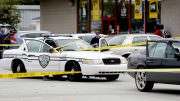The city of Chicago will pay more than $3.4 million to resolve a fatal police shooting lawsuit that sparked a review of how the city’s Law Department handles litigation involving allegations of serious officer misconduct, while paying $3 million for another fatal police shooting captured on video that began when a 17-year-old ran from a traffic stop carrying what turned out to be a black iPhone box.
The city’s Finance Committee on Monday is scheduled to consider settling a wrongful death lawsuit brought by the family of Darius Pinex, a 27-year-old father of three who was shot during a traffic stop in 2011. Under the terms of the settlement, the city would pay $2.365 million to Pinex’s family and more than $1 million to the lawyers for his estate, according to sources, federal court filings and city documents.
The total cost of the Pinex case — including the settlement amount, lawyers fees for both sides and the cost of the Law Department review it prompted — is about $6 million.
“We are happy that the city has resolved this matter, for the opportunity this settlement provides for Darius’ wonderful children,” said Steve Greenberg, the attorney for the Pinex family. “And we are hopeful that the history of this case will bring about meaningful change.”The Finance Committee also will consider a settlement of the lawsuit filed by the family of Cedric Chatman, shot and killed in 2013. Chatman was shot by Officer Kevin Fry in the South Shore neighborhood after officers curbed the Dodge Charger he was suspected of taking in a carjacking.
The Chatman shooting roiled Chicago when it was released in January. The footage showed two plainclothes officers pulling up to the sedan, and captured Fry firing several shots when Chatman fled the car on foot. Ho gun was found at the scene of the shooting.
The video also led to a dispute inside the Independent Police Review Authority , the city agency that investigates police shootings and allegedly cost investigating supervisor Lorenzo Davis his job. Davis has claimed his finding that the shooting was not justified was reversed over his objections, with IPRA eventually concluding the shooting was justified. Davis filed a federal lawsuit against IPRA; it was dismissed earlier this year, when a judge determined Davis’ refusal to change his finding was not protected free speech under the First Amendment.
Law Department spokesman Bill McCaffrey declined to comment on the pending deals, saying the city does not discuss lawsuit settlements before they are presented to the Finance Committee.
A federal jury initially concluded that Officers Raoul Mosqueda and Gildardo Sierra were justified in shooting Pinex, but the case erupted in chaos last January when U.S. District Judge Edmond Chang took the rare step of ordering a new trial after finding that a city lawyer had intentionally withheld crucial evidence. The bruising ruling detailed significant flaws in how Mayor Rahm Emanuel’s Law Department responds to civil rights cases, describing a byzantine system in which city attorneys don’t understand how police records are kept — and make little effort to find out.
A Tribune analysis earlier this year of nearly 450 cases alleging police misconduct since Emanuel took office found that a federal judge has had to order the city to turn over potential evidence in nearly 1 in every 5 cases.
In seven of those cases, the city’s conduct was found to be so inappropriate that federal judges took the unusual step of handing down sanctions. Chang has twice made the even rarer move of throwing out jury verdicts that had favored the city and ordering new trials.
In police abuse suits, city often withholds information
Days after Chang’s ruling in the Pinex case, Emanuel hired longtime Chicago lawyer Dan Webb to conduct an outside review of the department.Webb’s seven-month inquiry — which cost taxpayers $1.6 million — found no other intentional misconduct, but his team recommended more than 50 reforms to address problems in the embattled department. Stephen Patton, Emanuel’s hand-picked corporation counsel, also has instituted several new procedures, including a policy that drastically reduces the Police Department’s role in collecting documents for litigation.
Jordan Marsh, the city attorney accused of withholding the evidence, resigned immediately after Chang’s ruling. The Illinois Attorney Registration and Disciplinary Commission began disciplinary proceedings against him this summer.
Mosqueda and Sierra testified at trial that an emergency dispatch for a previous shooting led them to conduct a “high-risk” traffic stop on Pinex’s vehicle, blinding the driver with the spotlight on their marked squad car before eventually boxing the car in from the front and exiting with guns drawn.
The stop turned deadly when Pinex, the officers alleged, refused orders and slammed his car in reverse, throwing his passenger from the car and nearly running over Mosqueda. Sierra fired at least eight shots at the vehicle as it backed into a light pole. Mosqueda then fired multiple times from the passenger side, fatally striking Pinex in the head, court records show. A loaded pistol was later found underneath the driver’s seat.
Before the lawsuit was filed, a Law Department paralegal had asked the city’s Office of Emergency Management and Communications to save radio calls from the night of the shooting. OEMC provided a call about a pursuit in Zone 8 but did not turn over any such audio from Zone 6, where the officers were working, court records show.
During the middle of the trial, though, Marsh told Chang that 30 minutes of Zone 6 audio had been sent to a police sergeant in 2011.
Marsh, who did not know at the time what was on the recording, first said he had learned about the recording a few days earlier, then later said it had been the week before trial. When the judge pressed Marsh on why he hadn’t disclosed the existence of the recording as soon as he learned of it from a police sergeant, Marsh said it hadn’t crossed his mind that it would be something that might be helpful to the plaintiffs.
But when the call was turned over, the Zone 6 audio described a different Oldsmobile Aurora and did not mention a shooting. That undermined the officers’ testimony.
The jury found in the officers’ favor, even though it was told that the city had improperly withheld the call from Pinex’s attorneys.
After months of a post-trial investigation, Chang found that Marsh “intentionally concealed” knowledge of the radio call and misled the court about it. He also ruled that another city attorney, Thomas Aumann, who also has left the department, did not make a “reasonable effort” to find the recording before trial.
Source: www.chicagotribune.com




